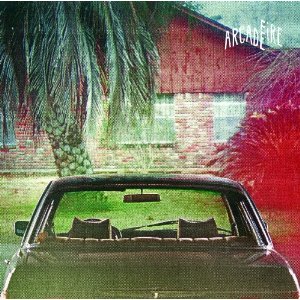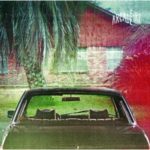
A little more than halfway through “The Suburbs,” the deservedly much hyped new release from Arcade Fire, the band drops a declarative statement of intent as blunt and penetrating as any lyric on any record this year. Win Butler sings during “Month of May,” “2009, 2010 wanna make a record how I felt then, as we stood outside in the month of May and watched the violent blow the wires away.” Throughout the album you get the sense that Butler, Regine Chassagne and co. took in the economic troubles, the social injustice, the never ending wars, the alienation and apathy of their generation and distorted values of their parents’ generation and distilled it into a lyrical and musical masterpiece. By the time you get to “Month Of May” they confirm what you could already sense, they took a good look and the landscape of the world since the release of Neon Bible in 2007 and set out to record a generation-defining album. It is certainly not the feel good record of the year, but the only way it would be less heartbreaking is if it wasn’t a reflection of the truth.
In the run up to the early August release the band has drawn comparisons ranging from U2 to Bruce Springsteen to Radiohead. While it’s true that if they hold to the form of their first three albums there is no reason they won’t sit up in the pantheon among those greats, the comparisons miss the mark. Arcade Fire is very much a band of the times, better than anyone they capture the sense of paranoia, alienation, and fear that exists in American culture today. U2 is too pop, Radiohead too British working class and Springsteen is, well, frankly too far removed to capture this generation’s angst. Thematically the album very much reminded me of 1979’s Fear Of Music by the Talking Heads, another masterpiece of alienation by a band that is a much better analogue for the Arcade Fire’s career so far than any of the aforementioned superstars. Both would sit on the outer edges of what you would think would be mainstream appeal, yet both rocketed to stardom during tough economic times despite a somewhat quirky style while capturing the cultural undertones of the time. Trace a line from the oil crises and stagflation of the late 70’s to the war on terrorism and the economic meltdown of recent times, trade CBGB in 1975 for Judson Memorial Church in 2007 and see them both headline Madison Square Garden a short time later.
Lyrically the album is spot on, the most consistent and engrossing of their three albums to date. No one is safe, no topic verboten. On “City With No Children,” the upper class and religious right “Never trust a millionaire quoting the sermon on the mount, I used to think I was not like them but I’m beginning to have my doubts, my doubts about it.” Under the swirling strings of “Rococo,” the hipsters whose independence belies a tendency to go with the pack fall under the lyrical radar. “They seem so wild but they are so tame, their moving forward but they are the same.” The feeling of paradise lost in the Suburb flows through the entire album, a reflection of a generation adrift, with no real sense of security and center. On “Sprawl I (Flatland),” “Said, well where do you kids live? Well sir if you only knew what that answers worth, been searching every corner of the earth.” All around you the characters in this album watch the markets crash, their elders sell them out as the malls and developments eat up more and more precious land. From “Half Light II (No Celebration),” “Oh, this city has changed so much since I was a little child, pray to god I won’t live to see the death of everything that’s wild.”
Had enough socio/politcal/ the world has come off the rails commentary? There are plenty of musical highlights as well. In the midst of capturing all of the turmoil Arcade Fire also prove that they are masters of song craft. Check out the rise and fall octave pattern and hallelujah chorus of “City With No Children” the most joyus tune amongst the downtrodden. The album begins with the gorgeous piano shuffle and hauntingly delivered chorus of the title track. Rarely has commentary on a generation that can’t feel or connect been so musically vibrant. The string arrangements on “Rococo,” “Empty Room,” and “Half Light II (No Celebration)” add a depth to the music without being pretentious, soaring lines for a society in decline. “Deep Blue” has a catchy chorus punctuated by hollow ringing piano lines that you will hum in your head all day. Therein lies the secret to Arcade Fire’s success to date, no matter how depressing the subject matter the music is so well played and the songs so intelligently put together that it makes it all bearable. It is almost ironic for a band that captures generational apathy so well. Who wants to think about the decline of western civilization without a catchy chorus to accompany it?
It isn’t a totally flawless album but it’s damn near close. The chorus to “Empty Room” sounds like a Meatloaf outtake, the b side to “Paradise by the Dashboard Light.” The synthesizer hook on “Ready to Start” seems dated and out of place, almost like the band was feeling nostalgic for the 80’s and threw it in for kicks.
But really this is nit picking. The Suburbs is a phenomenal album by a group of very talented musicians who have the balls to say something meaningful and the chops to make it interesting.



No Comments comments associated with this post